Australia accused of 'fixing' in ugly loss to Angola at FIBA World Cup

A completely forgettable FIBA World Cup group stage game between also-rans Australia and Angola took a sharp turn into the theatre of the absurd on Thursday, as the Aussies rested their key players and appeared to tank away the contest, drawing accusations that they were trying to manipulate the standings and achieve a more favorable match-up in the knockout round of the tournament.
Angola's 91-83 victory -- achieved only after Australia blew a double-digit lead in the second half by playing passive offense and totally neglectful defense -- opened the door for Australia to fall to third place in the Group D standings, thereby delaying a potential match-up with tournament favorites USA. Had Australia remained in second place in Group D, it would have been on track to face USA in the tournament's quarterfinals. By falling to third, Australia doesn't have to face USA until the semifinals.
Goran Dragic, Phoenix's All-NBA guard and the star of Slovenia, blasted Australia (3-2) for their unexpected loss to Angola (2-3), whose only previous victory had come against hapless South Korea (0-5).
"Basketball is a beautiful sport," Dragic wrote on Twitter. "There is no room for fixing the game like today Australia vs. Angola!! FIBA should do something about that!"
Dragic open to playing fewer minutes if it means Phoenix can keep Bledsoe
Team USA finishes perfect group play stage with familiar rout of Ukraine
Slovenia found itself directly impacted by Australia's loss once Dragic and company lost to Lithuania later Thursday. Group D's standings finished with Lithuania first and Slovenia second, setting up the Slovenians for a potential date with the Americans in the quarterfinals.
Afterward, coach Andrej Lemanis denied that Australia threw the game.
“We always, as Australians, compete the right way,” he said, according to AdelaideNow.com.au. "People will make up their own minds. There’s always going to be speculators. I can’t control what people think.”
Alleged tanking and the related prospect of match-fixing have been hot topics during the Olympics (badminton), the FIFA World Cup and also in the NBA, where the Tim Donaghy controversy has passed, but numerous teams appear to strategically rest players late in the season in an effort to influence draft lottery odds or produce a more favorable postseason matchup. This is usually a murky grey area. Are sidelined players actually injured or are they being rested, because they are too talented? Is there a meaningful difference between making a concerted effort to develop younger players and losing on purpose? Would a professional athlete really go along with throwing a game?
FIBA World Cup standouts on NBA teams' radars
What happened between Australia and Angola on Thursday, though, sure looked an awful lot like intentional losing. Despite resting two key players (Aron Baynes and Joe Ingles) and barely playing two others (Matthew Dellavedova and David Andersen), Australia's second-stringers easily held a 60-45 lead with three minutes left in the third quarter. That's when the craziness began, as the Aussies barely flinched while conceding a 20-5 run that allowed Angola to tie the game. The contest remained close until the three-minute mark of the fourth quarter, when Australia literally watched Angola go on an 8-0 run to put away the game.
The following is a look at some of the most egregious -- and, frankly, humorous -- sequences from Australia's collapse.
Third Quarter
Australia's three-part formula for blowing its lead seemed to be pretty straightforward: allow as many high-percentage shots as possible on defense, settle for deep jumpers on offense and mix in just enough scoring in hopes that no one would ask any questions.
Here's how the possessions unfolded during Angola's 18-5 run to close the third quarter:
Angola: 1) Made, uncontested dunk, 2) made, uncontested lay-up, 3) made, uncontested lay-up, 4) made, lightly-contested lay-up, 5) made, point-blank put-back plus a foul, 6) made, wide open three-pointer, 7) made, uncontested lay-up, 8) made, uncontested dunk.
Australia: 1) Missed, contested long two with 13 seconds left on the clock, 2) missed and contested three-pointer with 15 seconds left on the clock, 3) made corner three-pointer, 4) missed, wide open lay-up, 5) turnover, 6) made, easy lay-up, 7) missed, lightly-contested three-pointer with 15 seconds left on the clock, 8) missed fall-away three-pointer at the third-quarter buzzer.
As all that played out, the FIBA broadcasting team made comments like, "Australia looks a little lethargic here, almost as if they have this game won," and "Australia has to pick up their defensive intensity. They're struggling to know who they're guarding."
Lemanis did not opt to use a timeout, even though his team blew a double-digit lead and made zero stops while conceding 18 Angola points on just eight possessions. By comparison, Angola had managed only 12 points in the entire second quarter.
One particular lowlight from this sequence was produced by Brock Motum, who missed a deep three-pointer early in the clock and then shuffled out of the way, allowing an uncontested dunk in transition behind him.
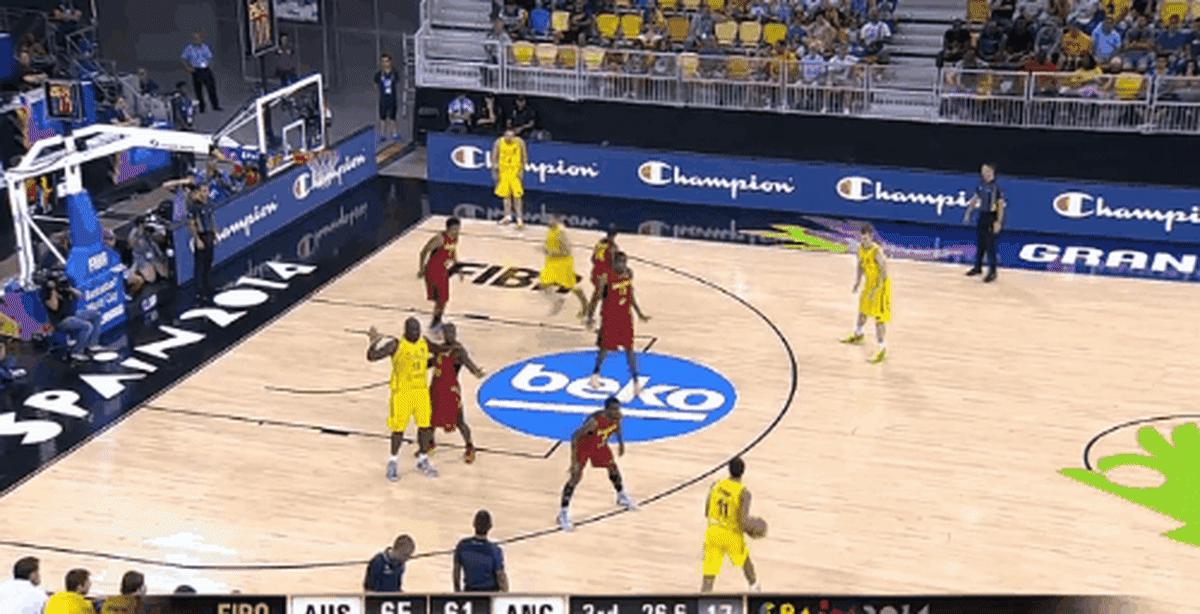
Fourth Quarter
With Angola now back in the game, Australia was free to kill some time and pursue its own offense. The fourth quarter began with the two teams exchanging buckets, although Angola continued to find easy second-chance points. On the evening, Angola would produce 48 points in the paint and 22 second-chance points, while enjoying a +10 rebounding advantage.
"Where is the rebounding from Australia? Two Angolan players are there and no one from Australia at all impacting," said one FIBA commentator during the final period, mystified.
The biggest beneficiary was Angolan big man Yanick Moreira, who finished with a game-high 38 points (on 17-for-24 shooting) and 15 rebounds. Of note, Moreira, who was averaging 12.8 points per game in the tournament entering Thursday's action, scored 34 of his points during the second half.
"He's dunked it so many times in this second half that the basket might need to be readjusted and put back in its place," one FIBA commentator noted.
Although the Australians never degenerated to purposefully throwing the ball into the stands, they did throw a number of regrettable passes in the fourth quarter on their way to 18 turnovers on the night. One such pass -- coupled with pathetic transition defense from Chris Goulding -- led to another dunk for Angola.
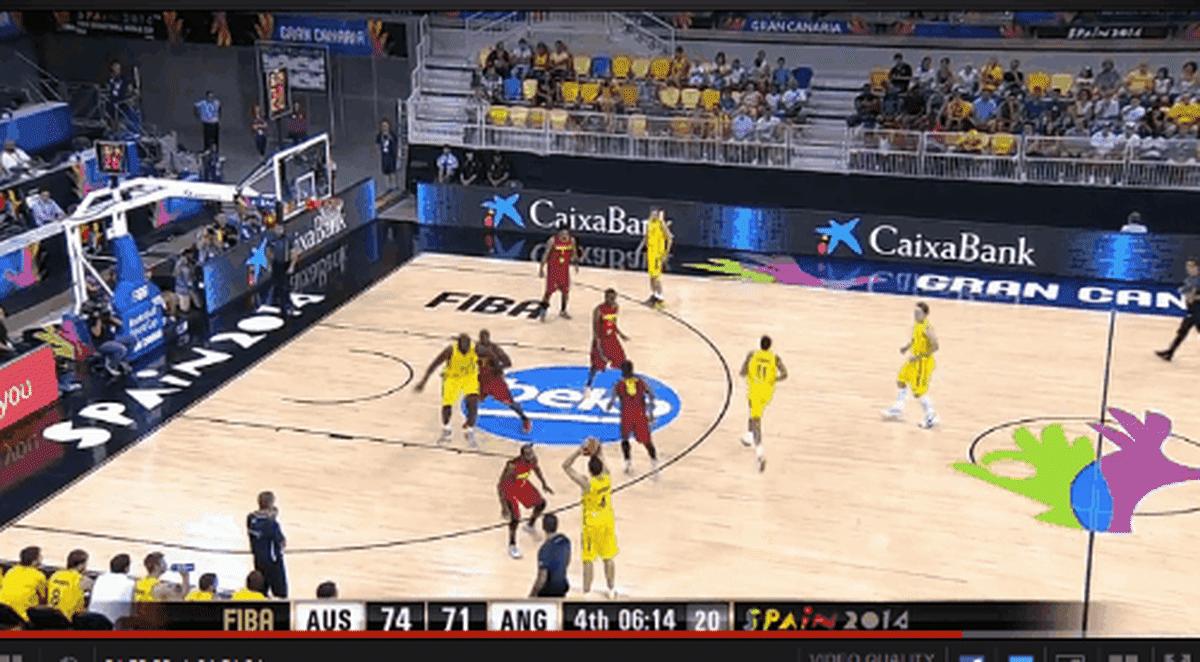
Crunch time saw Angola's closing 8-0 run gifted to them by Australia.
Here's an uncontested putback lay-up by Eduardo Mingas. After a jumper went up, multiple Australian players watched from well outside the basket area without moving into rebounding position.
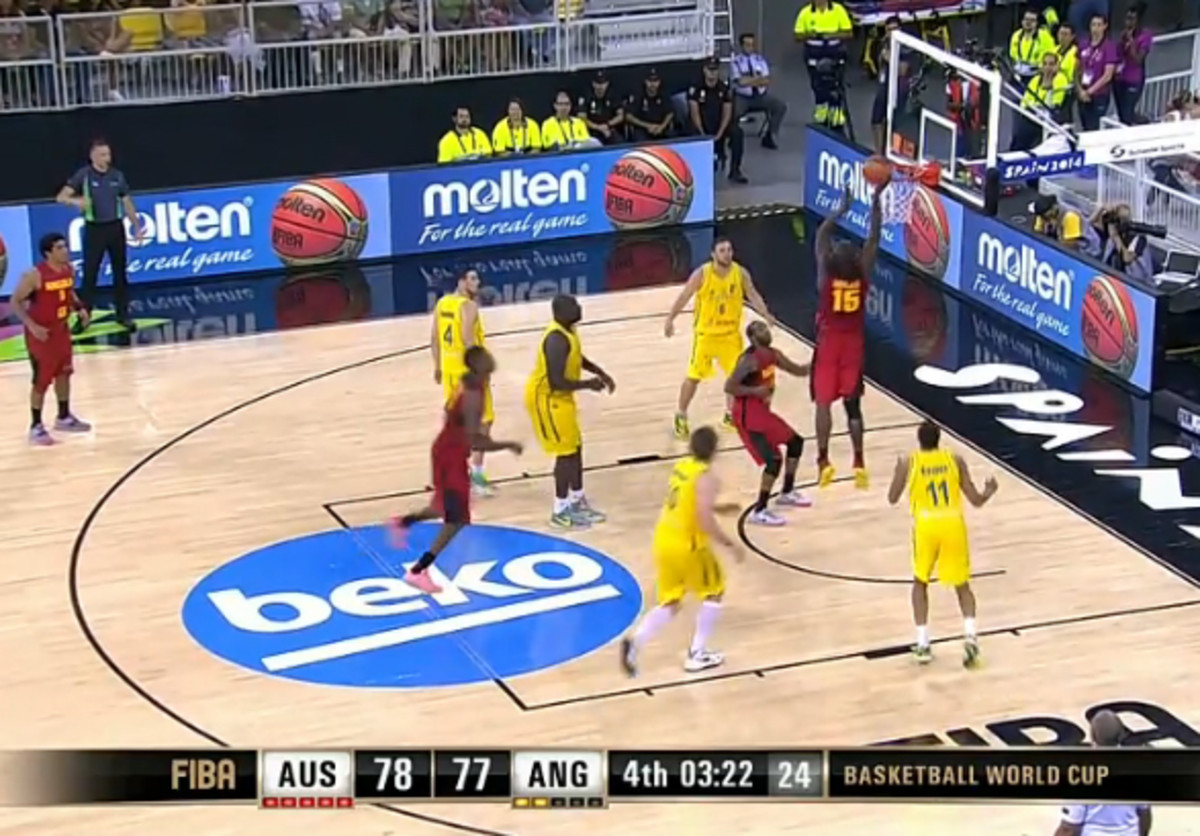
Here's a laughable, uncontested lay-up off the dribble by Roberto Fortes, who blew past with ease. No effort, no help.
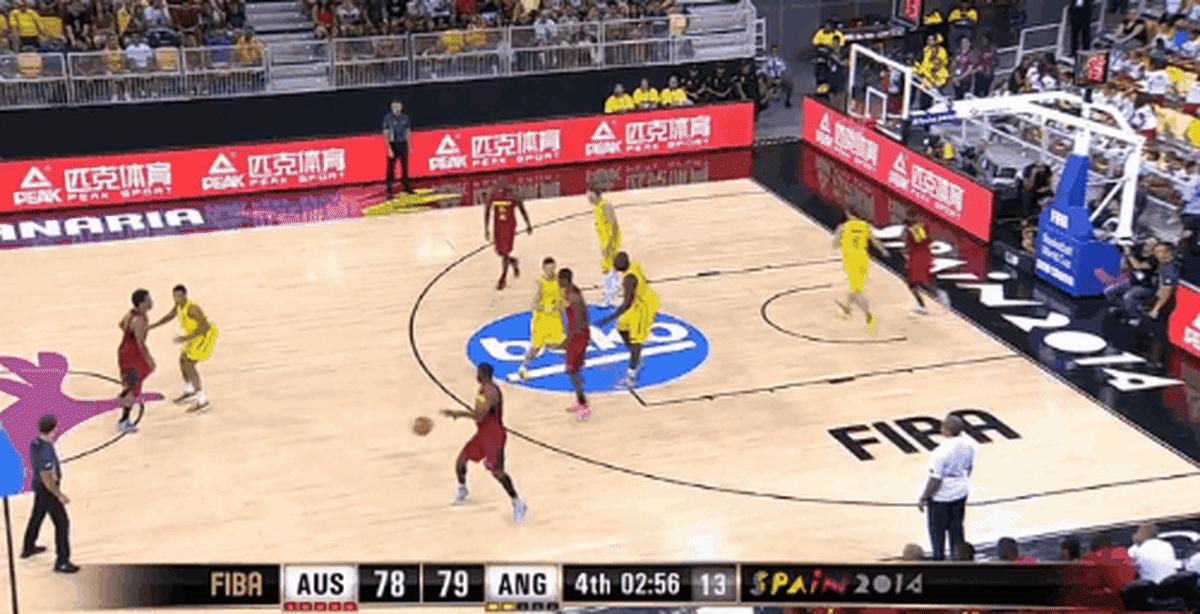
Here's another uncontested lay-up for that was put home only after Milton Barros missed his own uncontested layup.
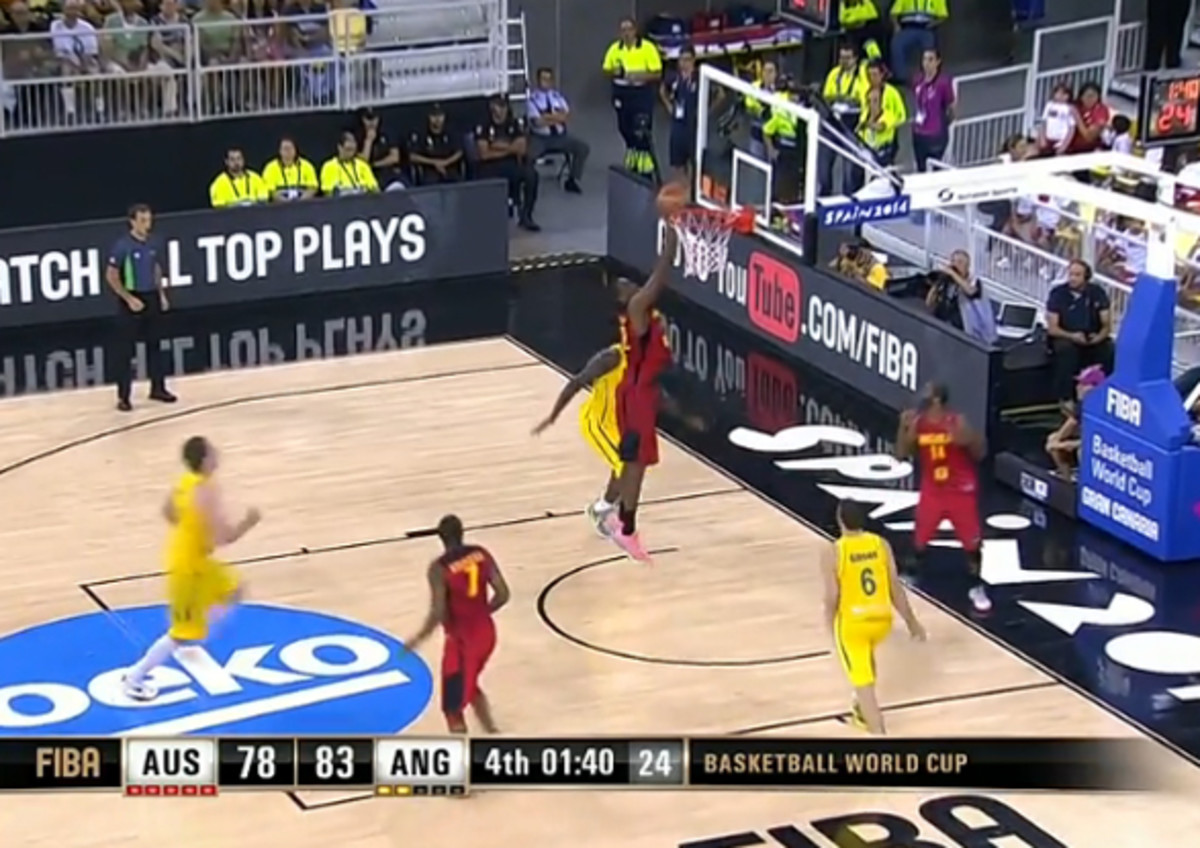
That run gave Angola the lead for good, but the weirdness still wasn't quite over. The endgame sequence saw Australia opt not to immediately foul on two different occasions, even though they were trailing by just four points with a little over a minute to play. After some clocked burned off, Australia did foul, but then failed to grab the defensive rebound on the second missed free throw, even though only one Angolan player made an attempt to rebound against three opponents. The Australians committed a turnover shortly thereafter, before again opting not to foul in the game's final moments, even though it was still a two-possession contest.
Team USA's top competition at FIBA World Cup
Perhaps most troubling from an NBA observer's perspective is that 2014 lottery pick Dante Exum, taken by the Jazz with the No. 5 pick, was on the court for much of the second half. After scoring nine points in the first half, Exum didn't score again until after Australia fell behind by a comfortable seven points in the game's final minutes. Even as his team conceded the major run in the third quarter and gave up basket after basket on the other end, Exum never attempted to take over by playing more assertively on offense.
See SI.com's hub for FIBA World Cup coverage
Unfortunately for FIBA, it now appears these alleged tactics have produced their intended result. Had Slovenia beaten Lithuania, the Australia/Angola game would have been a non-issue from a standings perspective, but now things are a little dicey, because Australia now enjoys the easier road to the medal roound after participating in a disputed outcome.
Should FIBA listen to Dragic by investigating the result to see what Australia and Angola have to say? Should FIBA pretend that this whole thing never took place? And, what happens if Australia succeeds in using its easier run through the knockout stage by advancing to the semifinals and winning a bronze medal? Wouldn't such an outcome stain the credibility of the entire event for many observers?
Those questions will linger until the Round of 16 opens in Spain on Saturday.
All images via WatchESPN.com
